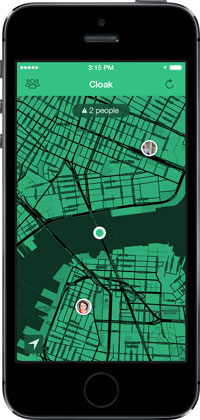



WASHINGTON — With the popularity of Facebook, Twitter, Instagram and other social networks that encourage people to share much of their lives online with friends and acquaintances, the backlash seemed inevitable — the growth of “anti-social” networks.
Private messaging apps, including Snapchat and WhatsApp, have drawn a lot of attention for providing an alternative to public status updates and tweets that are visible to the masses.
Now comes Cloak, which can help users avoid bumping into people they don’t want to be near. And Anomo bills itself as an anonymous social network.
Cloak’s tagline: “Incognito mode for real life.”
Scraping location data from Instagram and Foursquare, users of Cloak can select people they don’t want to accidentally encounter.
“We’ll notify you when anybody gets too close for comfort,” says Brian Moore, co- founder of Cloak.
The free app is currently available only in the Apple app store.
A map on the Cloak app plots the recent check-ins of Instagram and Foursquare contacts.
“Those two have the best location data out of all the social networks that exist,” says Moore.
“Facebook would be a potential addition, although the check-in information in that isn’t as widely used as the other two (networks),” he adds.
Moore says Twitter’s location data isn’t great, and often only specifies the city a person is in.
“So unless you’re trying to get away from people on a very macro level, it’s not as helpful,” Moore jokes.
Danger, danger Will Robinson
Here’s how Cloak works to avoid an ex-girlfriend, ex-boyfriend or ex-anything.
Users flag the specific people in their networks they want to steer-clear of, and choose the distance at which they want to be alerted.
Or, in “high alert mode,” a user can be notified when anybody they know is nearby, when they want to be off the grid.
An example? “If you’re playing hooky from work or school and you don’t want anybody to see you,” says Moore.
“Let’s say you’re walking down the block and come within a half-mile of your ex. Your phone will vibrate in your pocket, and you’ll see a push notification that says ‘Hark, your ex-girlfriend is half a mile away, watch out.'”
Despite the app’s ability to foster anti-social behavior, Moore says “we actually have heard of some people using it for positive things, like if they see someone at an interesting location, they’ll actually look at their photos, versus before when they’d just ignore them.”
Social network for shy people
For those open to human interaction, but on their terms, Anomo can help.
“Anomo is an anonymous social network app where people reveal themselves over time,” says James Sun, co-founder of the app, which is available for iOS and Android.
“People are very apprehensive about their private information getting out to everybody,” says Sun.
Instead of allowing everything about you to be seen with a single friend request, he says, Anomo “allows you to reveal different pieces of yourself as you get comfortable with someone that you met.”
Sun says posts on Twitter and Facebook rarely portray genuine emotion or beliefs, and show “a Sunday-suit look, instead of real, authentic conversations, because they’re afraid of the social consequences of posting something that might offend people.”
By slowly allowing more of a user’s life to be known, “people are a lot more upfront and honest about their opinions, and that allows people to find other people of common interest in a deeper way because it’s not superficial,” says Sun.
“It creates an accountability as well, it’s not like a 100 percent anonymous forum where you just get a bunch of junk.”
The loooonngg reveal
Initially, Anomo users communicate based on location and common interest tag words, says Sun.
Conversations can remain superficial, says Sun, although at some point users can share more about themselves.
“The other person can request that I reveal my photo, my name, my occupation,” says Sun. “If I feel comfortable enough, I can accept and allow them to see that piece of data.”
Sun says people using Anomo can let relationships develop at the pace they prefer, opening the door for meaningful conversation.
“Teenagers want to vent; they want to express themselves, they’re just inherently that way,” says Sun.







